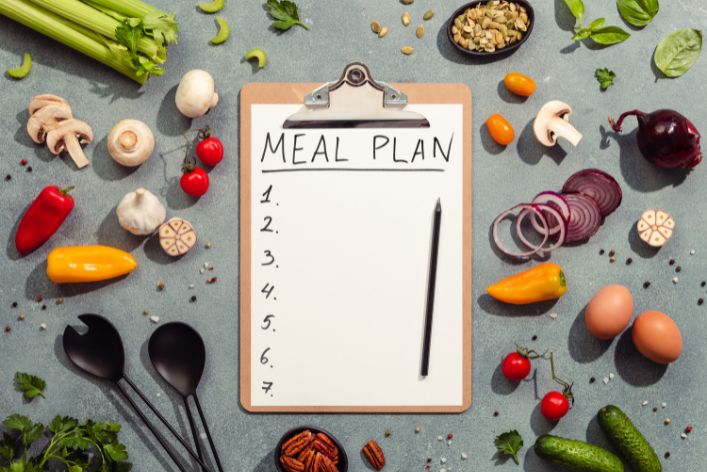Last Updated on May 16, 2023
Having a balanced and nutritious meal plan is crucial for maintaining a healthy lifestyle. A well-planned meal can provide your body with all the essential nutrients it needs. It helps you regulate your diet, control portion sizes, and reduce the risk of chronic diseases.
Following a meal plan has numerous benefits. It helps you save time and money by planning and preparing meals ahead of time. It also makes grocery shopping more manageable as it ensures you don’t buy unnecessary items. Additionally, a meal plan assists in achieving weight loss goals and enhances athletic performance.

Creating a meal plan may seem daunting at first, but it can be quite simple. First, identify your nutritional needs. Consider your age, gender, weight, height, and activity level. Next, decide on the number of meals and the serving sizes you require in a day. Plan to include a variety of whole foods such as fruits, vegetables, protein, and carbohydrates.
Use a meal planning template to help you design a weekly meal plan. Preparing a grocery list will also be of significant help. Schedule time for meal preparation, and consider batch cooking as it saves time and ensures you have healthy meals readily available.
Creating and following a meal plan is an effective approach to maintaining healthy eating habits. It ensures you get the necessary nutrients your body needs, saves time and money, helps you achieve weight loss goals, and enhances athletic performance. Start today and discover the joys of a healthy and balanced diet.
Read: The Paleo Diet: An Effective Way to Improve Your Health and Well-Being
Determine your nutritional needs
Knowing your nutritional needs is essential to maintaining a healthy diet. There are several factors that can affect your nutritional needs, including age, sex, physical activity level, and health status. By understanding these factors, you can determine the appropriate amount of nutrients your body needs.
Factors that affect your nutritional needs
- Age: As you age, your body’s nutritional needs change. For example, children may need more calcium and iron for growth and development, while older adults may require more vitamin B12 for cognitive function.
- Sex: Men and women have different nutritional needs. Women may need more iron and calcium due to menstruation and pregnancy, while men may need more protein for muscle growth.
- Physical activity level: The more active you are, the more calories and nutrients you need to fuel your body.
- Health status: Certain health conditions may require you to consume more or less of certain nutrients. For example, individuals with diabetes may need to monitor their carbohydrate intake.
Read: How to Lower Your Blood Pressure Naturally
Recommended daily intake of nutrients
There are several key nutrients that your body needs to function properly. These include:
- Protein
- Fat
- Carbohydrates
- Vitamins
- Minerals
- Water
The recommended daily intake of these nutrients can vary based on age, sex, and physical activity level. The US Dietary Guidelines provide general recommendations for daily nutrient intake based on a 2000-calorie diet.
- Protein: 50 grams/day (based on a 2000-calorie diet)
- Fat: 44-78 grams/day (20-35% of total calories)
- Carbohydrates: 225-325 grams/day (45-65% of total calories)
- Vitamins and minerals: Varied depending on the nutrient
- Water: 8 cups/day
How to calculate your daily caloric needs
Your daily caloric needs are determined by your basal metabolic rate (BMR) and physical activity level.
Your BMR is the amount of calories your body burns at rest. This can be calculated using the Harris-Benedict equation:
- For men: BMR = 88.36 + (13.4 x weight in kg) + (4.8 x height in cm) – (5.7 x age in years)
- For women: BMR = 447.6 + (9.2 x weight in kg) + (3.1 x height in cm) – (4.3 x age in years)
Once you have calculated your BMR, you can then determine your total daily energy expenditure (TDEE) by multiplying your BMR by your physical activity level. The Calorie Calculator provides an estimation of TDEE based on the Harris-Benedict equation and physical activity level.
By understanding your nutritional needs, you can create a well-rounded diet that meets your body’s needs. Remember to vary your food choices and focus on nutrient-dense foods.
Read: 10 Easy and Delicious Meal Prep Ideas for a Busy Week
Choose nutrient-dense foods
Choosing nutrient-dense foods is a key component of maintaining a healthy diet. Nutrient-dense foods are those that provide a high amount of nutrients relative to the number of calories they contain. This means that when you consume nutrient-dense foods, you are getting more bang for your buck in terms of the nutrients that your body needs to function optimally.
Foods to Include in Your Meal Plan for Optimum Nutrition
- Fruits and vegetables
- Whole grains
- Lean sources of protein, such as chicken, fish, and legumes
- Low-fat or non-fat dairy products
- Healthy fats, such as avocados, nuts, and olive oil
It is important to include a variety of these foods in your diet in order to get a wide range of essential nutrients.
Read: Staying Hydrated: Tips for Better Athletic Performance
How to Balance Macronutrients
Macronutrients are the nutrients that your body needs in large quantities in order to function properly. These include carbohydrates, protein, and fat.
When planning your meals, it is important to make sure you are getting an appropriate balance of these macronutrients. A general guideline is to aim for a diet that is 45-65% carbohydrates, 10-35% protein, and 20-35% fat.
However, the exact balance that is right for you may vary depending on your individual needs and goals. Consulting with a registered dietitian can be helpful in determining the best macronutrient balance for you.
Read: How Your Gut Health Contributes to Weight Loss
The Importance of Fiber and Water Intake
In addition to consuming nutrient-dense foods and balancing macronutrients, it is important to pay attention to your intake of fiber and water.
Fiber is important for maintaining healthy digestion and can also help lower cholesterol levels and reduce the risk of chronic diseases. Good sources of fiber include fruits, vegetables, whole grains, and legumes. Aim for at least 25 grams of fiber per day.
Water is also essential for proper bodily function. It aids in digestion and can also help with weight management by providing a feeling of fullness. Aim for at least 8 cups of water per day, and more if you are physically active or live in a hot climate.
By including nutrient-dense foods in your meal plan and paying attention to your macronutrient balance, fiber intake, and water intake, you can maintain a healthy and balanced diet that supports your overall health and well-being.
Read: The Top 10 Superfoods You Need to Include in Your Diet
Plan your meals
Meal planning and preparation can be daunting tasks, but they are essential for a healthy lifestyle. When planning your meals, there are several things you must consider to ensure that you stay on track with your health goals.
Weekly Meal Planning
- Choose a day of the week to plan your meals for the upcoming week
- Make a list of the meals you want to eat for breakfast, lunch, and dinner
- Take note of any special events or occasions that may impact your eating schedule
Once you have a plan in place, it becomes easier to stick to healthier food choices since you know exactly what you’ll be eating each day.
Meal Prepping Tips
- Designate a day to prep your meals for the week
- Cook in bulk and portion out meals in containers for easy access and portability
- Use the right containers to ensure that your food remains fresh and bacteria-free
Meal prepping allows for more efficient use of your time and money. You save money by buying in bulk and cooking at home instead of eating out.
Incorporating Variety in Your Meal Plan
- Choose a variety of whole foods such as vegetables, fruits, lean meats, and whole grains
- Try new recipes and experiment with different flavors and spices
- Switch up your protein sources to avoid boredom and to ensure that you’re getting all the essential amino acids your body needs
Eating the same thing every day can be monotonous, making it difficult to stick to a healthy diet. Adding variety to your meals makes healthy eating enjoyable and sustainable.
As you can see, planning and prepping your meals is essential for achieving your health goals. A little bit of planning can go a long way in ensuring that you stay on track with your diet and lifestyle choices. Soon enough, you’ll find that meal planning and preparation have become second nature.
Read: What Does Calorie Deficit Mean?

Tips for sticking to your meal plan
Creating a meal plan is the first step toward achieving your health goals. It creates structure and eliminates the impulsive choices made when you are hungry and don’t have a game plan. However, sticking to a meal plan is not easy, but don’t worry, we’ve got you covered. Below are some tips on how to stick to your meal plan.
How to manage cravings
- Drink water – sometimes your body mistakes thirst for hunger
- Eat balanced meals – eat meals that contain a combination of protein, carbs, and healthy fats
- Choose healthy snacks – like fruits, veggies, and nuts to keep you feeling full and satisfied
- Distract yourself – go for a walk, call a friend, or do something to take your mind off your cravings
- Plan for indulgences – allow yourself to have a treat, in moderation, so you don’t feel deprived
Making adjustments to your meal plan
- Be flexible – if your plan isn’t working, make changes to it, don’t give up
- Be realistic – don’t make a plan that is too restrictive and leaves you feeling hungry all day
- Tweak portion sizes – if you’re not feeling full after a meal, adjust the portions to meet your needs
- Experiment with different recipes – eating the same meals every day can get boring, switch it up
How to meal prep for busy weeks
- Choose simple recipes – save time by finding recipes that use minimal ingredients and don’t take long to prepare
- Use multi-purpose ingredients – pick recipes that use ingredients in multiple dishes for maximum efficiency
- Batch cook – prepare large portions of food to eat throughout the week or freeze for later
- Prepare snacks – keep healthy snacks like cut-up veggies and homemade granola bars in the fridge for easy access
- Have a backup plan – in case something unexpected happens, have a plan B like a healthy takeout option
Sticking to your meal plan may seem daunting, but with these tips, you’ll be a pro in no time. Remember to be patient and give yourself grace. It takes time to build new habits and sticking to a meal plan is a lifestyle change. Keep at it, and you will see results.
Read: Unleash Tea’s Healing Magic: Transform Health with Potent Brews
Conclusion
The key takeaway from this discussion is the significance of consistency in achieving a healthy lifestyle. It is not enough to eat healthy once in a while or exercise irregularly. Rather, following a balanced and nutritious meal plan on a regular basis can bring numerous benefits for our physical and mental health.
Meal planning, in particular, is an effective tool to ensure that we are nourishing our bodies with the right amount of nutrients and energy we need. It also saves us time, and money, and reduces food waste. Most importantly, it helps us avoid unhealthy food choices and keeps us on track toward reaching our health goals.
If you haven’t tried meal planning before, now is the perfect time to start! Begin by setting realistic goals and creating a meal plan that suits your lifestyle and dietary requirements. Stick to it as much as possible but don’t be too hard on yourself when unexpected situations arise. Remember, consistency is key, and small changes can make a significant impact on your health and well-being.
To summarize, making healthy choices, such as following a balanced and nutritious meal plan, is a crucial step towards achieving a healthier lifestyle. Let’s take action and commit to making these changes, one meal at a time.
Before You Go…
Hey, thank you for reading this blog to the end. I hope it was helpful. Let me tell you a little bit about Nicholas Idoko Technologies. We help businesses and companies build an online presence by developing web, mobile, desktop, and blockchain applications.
We also help aspiring software developers and programmers learn the skills they need to have a successful career. Take your first step to becoming a programming boss by joining our Learn To Code academy today!
Be sure to contact us if you need more information or have any questions! We are readily available.











